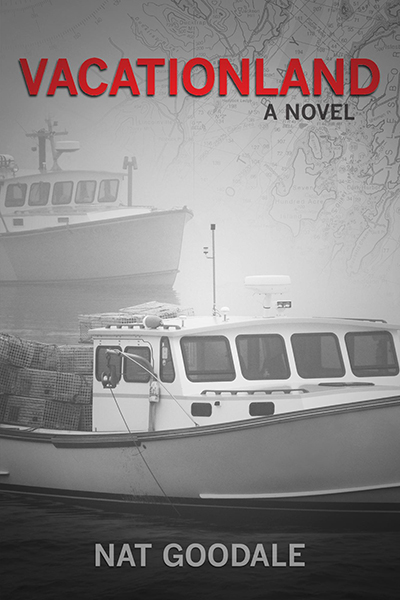 Vacationland
Vacationland
 Critique by Ellen LaFleche
Critique by Ellen LaFleche
One of the questions I asked myself during the screening process was whether or not I would have finished reading a contest entry from cover to cover, if I had checked it out of the library for pleasure rather than work. There were few entries for which my answer was an enthusiastic yes.
Vacationland by Nat Goodale was one such enthusiastic yes. This literary novel centers on the seafaring adventures of Donny Coombs, a Maine lobsterman who falls in love with the daughter of a rich tourist while fighting the gentrification of his town. The witty and richly imagistic writing style enhances the plot, forcing the reader to turn the page to see what will happen next.
The dialogue is perfectly pitched, providing insight into the inner lives of the characters. I especially appreciate the writer's deep exploration of working-class lives and his depiction of the hardships of commercial fishing. Class warfare is a theme that unifies the story in rich and complicated ways.
I have always loved reading ocean stories, and while I have little knowledge of boats and how they work, I always appreciate being launched into the fictional world of fishing. Unfortunately, one weakness of the story (and this may turn out to be a strength for some readers) is that I didn't always understand some of the technical aspects of boating and fishing provided by the author. This tempted me to skip a few pages here and there. Because the character of Donny was so interesting, I was able to stay with the story even though the technical descriptions of fishing were sometimes a bit, well, boring. An unflinching editorial hand would have been helpful here.
I also appreciated the complexities of Donny's relationship with Shelly, the Harvard-bound daughter of an upper-class summer resident of the town. I could feel the chemistry between the two, and while the objections of Shelly's parents were somewhat clichéd, I couldn't help rooting for the relationship to work. A possible spoiler alert prevents me from providing more details here, as does the fantastical caper that ends the book. A minor complaint is that several times Donny found himself admiring Shelly's crooked teeth, a detail that doesn't feel valid. Her upper-class parents surely would have insisted on braces when Shelly was a child.
The printed book layout and construction looked professional, though the front cover had a tendency to curl up. The greyscale cover image of fishing boats conveyed the novel's theme and "noir" atmosphere, but the red block capitals of the title were not the most attractive complement to the hues and subtle mood of the photo. Cooler colors and a copperplate or handwriting-style typeface would better conjure up rural New England.
This bittersweet tale would make a wonderful movie, combining romance with colorful Maine characters and seafaring adventure—and that is surely great news for any fiction writer.








